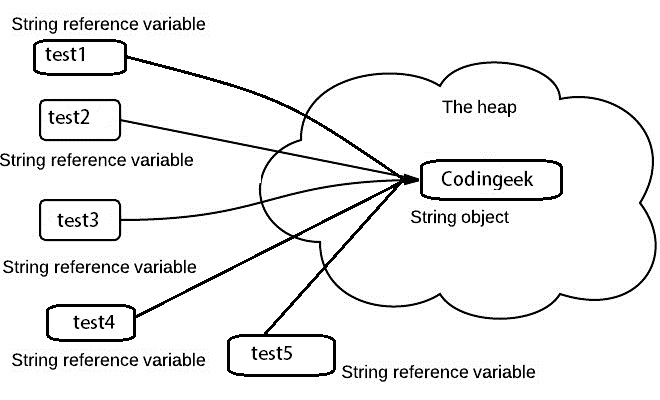Why Are Strings Immutable in Java? Checking Out the Style Choices
Wiki Article
Checking Out the Benefits of Immutable Strings in Modern Programming Paradigms
In the realm of contemporary shows standards, the principle of unalterable strings stands as a cornerstone of durable software program development. By taking on unalterable strings, designers can make sure improved data stability, boosted string safety, simplified debugging procedures, increased security actions, and effective performance optimization.Improved Data Integrity

By protecting against the adjustment of string things, immutability removes the danger of unintended modifications to the information they hold. This not only boosts the security of the info however also boosts the integrity of the code that depends on these strings.
Immutability additionally sustains more secure multithreading settings, as simultaneous access to unalterable strings does not present the danger of data corruption with simultaneous adjustments. This home streamlines the procedure of handling strings in identical shows circumstances.
Essentially, immutability functions as a protective shield around the information stored within strings, improving their honesty by ensuring that once specified, their values stay unchanged throughout the program's execution.

Improved Thread Safety
Unalterable strings enhance the thread security of programs by making sure that once a string item is created, its worth can not be changed. This residential property eliminates the threat of concurrent strings trying to customize the same string simultaneously, which can result in information corruption or inconsistent states in the program - Why are strings immutable in Java?. In a multi-threaded setting, where multiple threads access and control data at the same time, the immutability of strings supplies a level of safety and security by assuring that the data remains unmodified throughout its lifecycleSimplified Debugging Procedures
Given the enhanced string safety and security promoted by immutable strings, a significant advantage develops in the world of simplified debugging processes. Unalterable strings, when produced, can not be modified, making it much easier to map the circulation of data and identify the resource of bugs in a program. This immutability guarantees that strings stay consistent throughout the implementation of the program, decreasing the possibility of unforeseen modifications that can bring about errors.When debugging with mutable strings, developers commonly come across concerns where a string's value is modified inadvertently, making it challenging to determine the source of an insect. However, with unalterable strings, the information stays unchanged, allowing designers to concentrate on examining the real logic of the code instead of locating where and when a string was customized incorrectly.
Additionally, immutable strings simplify the debugging process by allowing much easier reproduction of bugs. Because unalterable strings do not transform state, developers can recreate and study bugs more efficiently, causing quicker identification and resolution of problems within the codebase. This streamlined debugging workflow ultimately adds to higher software program quality and enhanced overall development efficiency.

Increased Safety Actions
Enhancing information protection and fortifying Full Report system integrity, the application of unalterable strings in software application applications contributes substantially to boosted safety and security steps. Unalterable strings, once developed, can not be modified, offering a critical defense versus harmful tampering or unauthorized gain access to. By ensuring that sensitive information saved in strings stays unaltered throughout the program's execution, the threat of information breaches or injection attacks is significantly lowered. Why are strings immutable in Java?. Immutable strings likewise play a crucial role in preventing common safety vulnerabilities such as buffer overflows and SQL injection assaults, as attempts to manipulate string data at runtime are naturally limited.In addition, the immutability of strings improves the predictability of program actions, making it much easier to confirm inputs and stop unforeseen changes that could jeopardize protection. This predictability simplifies the process of auditing and verifying code, making it possible for programmers to recognize possible safety loopholes a lot more properly. Generally, including immutable strings into software application advancement practices not only enhances the effectiveness and integrity of applications yet additionally strengthens their strength versus security threats.
Efficient Efficiency Optimization
When dealing with mutable strings, operations like concatenation or substring creation typically result in the creation of new string items, leading to memory overhead and increased processing time. By permitting strings to remain consistent and unchangeable, immutable strings facilitate much better memory monitoring and caching possibilities, inevitably boosting the general efficiency of the software.
Because unalterable strings can not be modified once developed, they can be shared across threads without the risk of unforeseen adjustments, reducing the need for synchronization mechanisms and boosting concurrency. Unalterable strings streamline debugging procedures as programmers can rely on that a string's worth will certainly continue to be regular throughout the program's implementation, removing potential errors created by mutable state modifications.
Verdict
To conclude, the advantages of making use of unalterable strings in modern shows standards can not be overemphasized. Boosted information honesty, improved thread safety, streamlined debugging processes, boosted safety steps, and reliable performance optimization all add to the general efficiency of shows jobs. By incorporating unalterable strings into programs methods, programmers can take advantage of a much more dependable and durable codebase.Immutability, a key function of strings in programs languages such as Java and Python, ensures that once a string things is created, it can not be modified or changed.Unalterable strings improve the string safety and security of programs go now by making sure that as soon as a string item is produced, its value can not be changed. Unalterable strings additionally play a vital role in protecting against typical safety and security vulnerabilities Discover More Here such as buffer overflows and SQL shot attacks, as attempts to manipulate string information at runtime are inherently restricted.
By enabling strings to remain unchangeable and consistent, unalterable strings facilitate much better memory monitoring and caching chances, ultimately enhancing the total performance of the software application.
Immutable strings simplify debugging procedures as programmers can trust that a string's worth will continue to be consistent throughout the program's implementation, eliminating prospective errors triggered by mutable state changes.
Report this wiki page